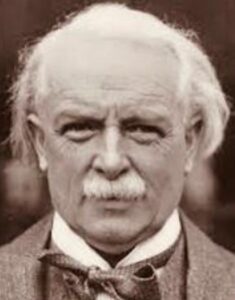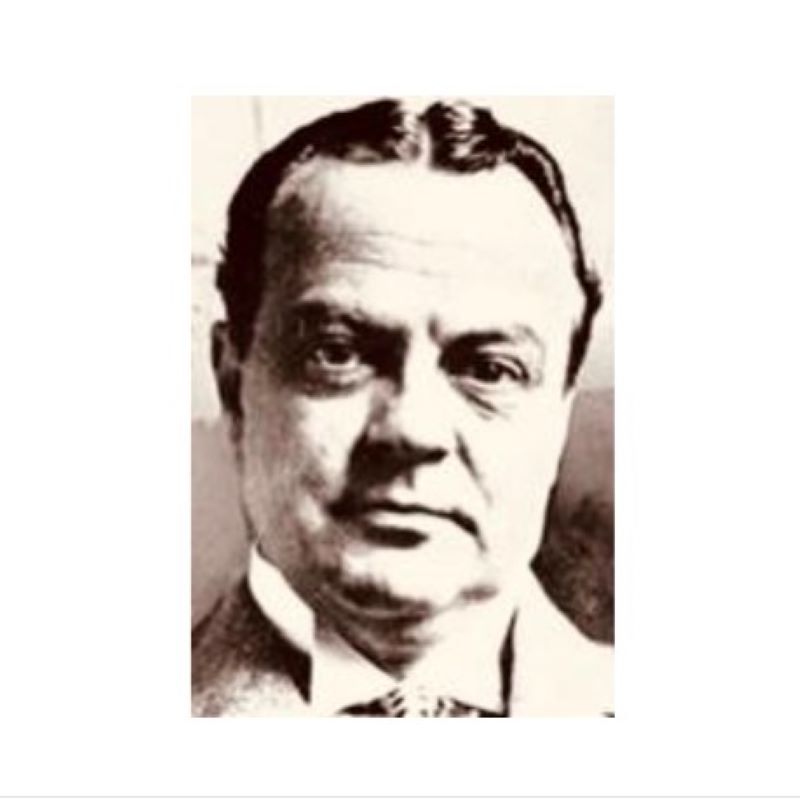by Martin Brisland.
Arthur John Maundy Gregory (1877-1941), from Southampton, was a British theatre producer and political fixer. Gregory (pictured top) gained power and wealth through handling the sale of titles and the alleged blackmail of prominent politicians.
Described as “a monocled dandy”, he wore jewellery including a green scarab ring he claimed had been Oscar Wilde’s. He also carried a rose-coloured diamond in his waistcoat pocket which supposedly had belonged to Catherine the Great.
Although best remembered for selling honours for Prime Minister David Lloyd George, he may have been involved with the fake Zinoviev Letter which smeared the Labour Party in the 1924 election. He was also connected to the disappearance of Labour MP Victor Grayson in 1920. He had accused Lloyd George of corruption as he was last seen entering Gregory’s house. There was also the suspicious death of his platonic companion, Edith Rosse.
He was the second son of Francis Maundy Gregory, vicar of St. Michael’s Church, and his wife, Elizabeth, and was born at 9 Portland Terrace, Southampton on 1st July, 1877. Gregory attended Banister Court school then Oxford University but left in 1899, before graduation.
In 1901 he briefly became the manager of the Prince of Wales Theatre in Ogle Road. By 1914 he had become a private detective, and in WW1 he is said to have worked for the Secret Service.

In 1918 the Prime Minister Lloyd George needed money to fight the election of that year and embarked on a policy of selling honours for contributions to his party. He needed an intermediary and Gregory, with his society contacts, fitted the bill perfectly.
At the time, prices for honours ranged from £10,000 (about £0.5 million today) for a knighthood to £40,000 (£2 million) for a baronetcy.
Estimates are that Gregory transferred about £99 million in today’s values to the Liberal and Conservative parties and that he received a commission of around £3 million a year. He is said to have suggested the new award of the OBE as he got a payment each time.
The ensuing scandal meant the sale of honours was made illegal in 1925. In September 1924, MI5 claimed to have intercepted a letter signed by Grigory Zinoviev, chairman of the Comintern in the Soviet Union. The letter urged British communists to promote revolution through acts of sedition. Someone leaked the letter and it was published in the Times and Daily Mail newspapers four days before the 1924 General Election. It contributed to the defeat of Ramsay MacDonald and the Labour Party.
Some claimed that Maundy Gregory and Ukrainian born Sidney Reilly, a British spy, had forged the letter and that Major George Ball, a MI5 officer, leaked it to the press. In 1927 Ball went to work for the Conservative Central Office where he pioneered the idea of spin-doctoring.
In the late 1920s Gregory diversified into selling Papal honours, having converted to Roman Catholicism. He had an office in Whitehall at 38 Parliament Street, which had a rear office in Cannon Row as an escape route.
He used his money to buy property including the Ambassador Club in Soho and the Deepdene Hotel in Dorking. This became a well-known meeting place for politicians, society figures, artists and even royalty. He published society magazines Mayfair and the Whitehall Gazette and bought Burke’s Landed Gentry guide.
Gregory gathered incriminating gossip about the private lives of those who stayed at the two properties. The Dorking hotel gained the reputation of being “the biggest brothel in southeast England”. According to one biographer Gregory kept dossiers on people in high positions, especially those who were homosexual.
Gregory made many friends who were prominent members of British society, including the Duke of York, later King George VI, father of the late Queen Elizabeth. He was a steward at the future king’s wedding and later received a gold cigarette case from him.
In 1927, after the government blocked Gregory’s honours-selling scheme he began selling non-British honours, such as noble titles from Ukraine, papal honours and dispensations. Among his victims was the Catholic father of actor Mia Farrow, to whom he had promised a marriage annulment so he could marry the Catholic Hollywood star Maureen O’Sullivan.
By 1932 Gregory had money problems. He had to repay £30,000 to the executors of the estate of Sir George Watson who had paid the money for a baronetcy he never received before his death.
Also in 1932 his long-time friend, actor Edith Rosse, died in suspicious circumstances leaving him £18,000. He leased a house to Rosse and her husband in 1920 and moved in with them the following year. After Rosse separated from her husband in 1923, she and Gregory continued to live under the same roof in a platonic relationship as Gregory was homosexual.
The couple moved to the nine-bedroom Abbey Lodge. The house was later converted into the EMI recording studios at Abbey Road where the Beatles famously recorded.
Rosse was persuaded to change her will only a few days before her death. It was written on the back of a Carlton Hotel menu and he inherited her money. Gregory had seen to it that Rosse’s grave was located in very wet shallow ground with an unsealed lid at Bisham on Thames, possibly to destroy evidence of poisoning.
After a prison term he went to live in Paris where he styled himself Sir Maundy Gregory on a £2,000 annual pension from sources close to the Conservative Party. Following the German occupation in 1940, he was arrested, sent to an internment camp, fell ill and died in the Val de Grace military hospital on 28 September 1941. Unlike others who died in enemy captivity, he is not listed among civilian deaths in France by the Commonwealth war Graves Commission.
- In Common is not for profit. We rely on donations from readers to keep the site running. Could you help to support us for as little as 25p a week? Please help us to carry on offering independent grass roots media. Visit: https://www.patreon.com/incommonsoton

